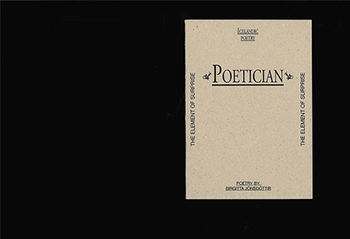(单词翻译:单击)

Iceland, it seems, is full of hidden poets.
冰岛似乎到处都是隐藏的诗人。
When they’re not at their day jobs, a great many of the island’s 330,000 inhabitants dabble in verse, including politicians, businessmen, horse breeders and scientists who study the genetic isolation of the island in pursuit of medical breakthroughs. Even David Oddsson, who was prime minister in 2002 (when Iceland’s banks were privatized) and central bank governor in 2008 (when they collapsed), is a poet by training.
在从事本职工作之余,岛上33万居民中有许多人会寄情文字,包括政治人物、商人、马匹育种师和为追求医学突破而苦苦研究该岛屿遗传隔离性的科学家们 。即便是2002年(那一年冰岛的银行实行了私有化)当上冰岛首相、2008年(那一年冰岛的银行破产了)当上冰岛中央银行行长的大卫•奥德松(David Oddsson),也是科班出身的诗人。
Birgitta Jonsdottir, the leader of the anarchist-leaning Pirate Party, which did well in a recent general election, describes herself rather loftily as a “poetician.” Her first published poem, “Black Roses,” written when she was 14, is about a nuclear holocaust.
带有无政府主义倾向的海盗党(Pirate Party) 在近期的选举中表现良好,其领袖比吉塔•约恩斯多蒂尔(Birgitta Jonsdottir)颇为高傲地自称是“诗治家”(poetician)。她发表的第一首诗《黑玫瑰》(Black Roses)讲的是一场核灾难。
Kari Stefansson, one of the world’s leading geneticists and the founder of Decode Genetics, recalled a poem he wrote in 1996, a few months after the birth of Dolly, the cloned sheep.
卡里•斯特凡松(Kari Stefansson)是世界顶尖的遗传学家之一,也是解码遗传学的创始人,他回忆了1996年克隆羊多丽(Dolly)诞生几个月后他写下的一首诗。
“I was a little bit depressed,” Mr. Stefansson said in his office, which, with its slit windows and computer screens, looked a bit like the interior of a spaceship. “One of my ways to deal with that was to write a small poem,” he said, before proceeding to recite it:
“当时我有点郁闷,”斯特凡松在自己的办公室里说,狭长的窗子和电脑屏幕在一起,把这里变得有点像太空船的内部。 “我处理这种情绪的办法之一,就是写一首小诗,”接着他背诵起来:
Where do I find, lost in the brightness of a sunlit day, The happiness of an unhappy man Fortunate only to be just one copy of himself. Everything else stinks.
明媚的日子里洒满了阳光,不幸者的幸福却无处寻觅。幸运只是他的一份复制品,其余的一切全都散发臭气。
Poetry is a national pastime, but not a particularly “specialist activity,” said Sveinn Yngvi Egilsson, a professor of Icelandic literature at the University of Iceland. “It’s part of being an Icelander,” he said. “Yes, it’s charming, isn’t it?”
诗歌是一种全民消遣,但并不是什么特别的“专业活动”,冰岛大学冰岛文学教授斯温•伊格维•埃吉尔松(Sveinn Yngvi Egilsson)说。 “这是冰岛人的一部分,”他说。“是的,很迷人,不是吗?”
In earlier times, verses were an integral part of social gatherings and were often improvised, he said. Poetry contests were held, with the prizes going to the wittiest, sharpest verses. The most popular verse form, he said, is called “ferskeytla,” four rhymed lines that can be divided into two parts.
他说,在早年间,诗歌是冰岛社交聚会不可或缺的组成部分,经常是即兴创作的。还会举行诗歌比赛,最风趣、最犀利的诗歌会获得嘉奖。他说,最流行的诗歌形式名叫“ferskeytla”,它有四句押韵的诗句,可以分为两部分。
Icelanders are unusually prolific readers and writers, and books of verse tend to sell well in Iceland. Poetry was the third-largest category of books published in the country in 2014, after fiction and the arts, according to figures from the national library. Far more poetry books were published in Iceland that year than books about economics or public administration. (There were apparently none at all about finance.)
冰岛人在阅读和写作方面格外勤奋,诗歌类书籍在冰岛往往能够卖得很好。根据国家图书馆的统计,2014年该国家出版的书籍之中,诗歌类列第三,位居小说和艺术之后。那一年在冰岛出版的诗歌远远多于经济学或公共管理方面的书籍(金融类书籍似乎一本都没有)。
The cold oceanic climate and long winter nights may also have something to do with it. “People usually get bored, and they try to humor each other,” Professor Egilsson said. “One of those ways is poetry.”
这可能也同这里寒冷的海洋气候与漫长的冬夜有关。 “人们往往会觉得无聊,于是就试着相互逗个乐,”埃吉尔松说。 “其中一种方式就是诗歌。”


